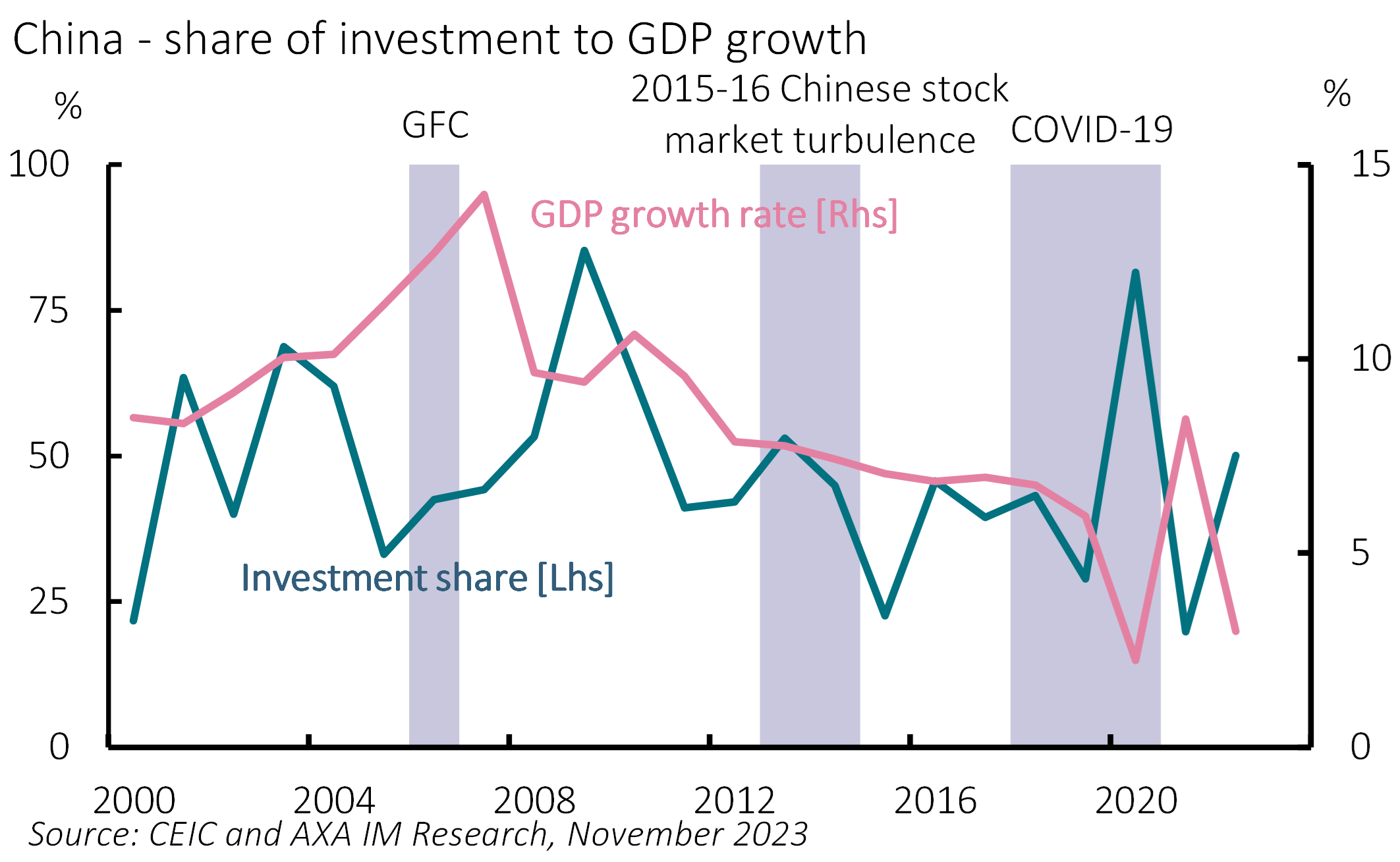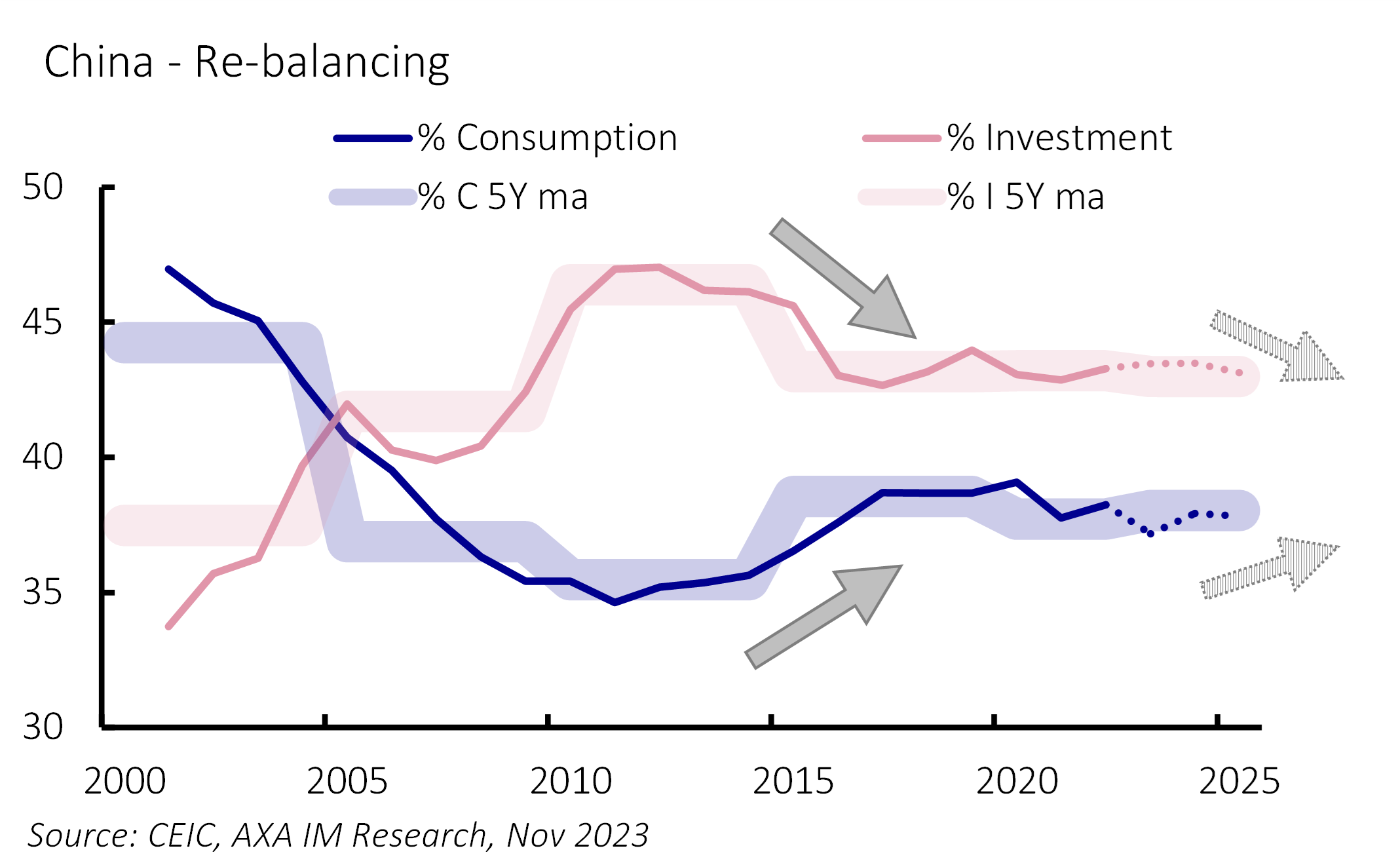
China Outlook – Short-term reprieve, long-term challenges
- 30 Noviembre 2023 (5 min de lectura)
Key points
- 2023 – the first-year post-pandemic – endured a sluggish first half due to wavering confidence and delayed policy boosts. Stimulus has quickened the pace since
- 2024 is expected to grow at a faster quarterly pace, backed by supportive measures and eventually firmer external demand
- But the economic upswing from announced stimuli looks set to fade into 2025 and could lead to future imbalances, requiring a potentially prolonged adjustment period
Free from COVID-19 disruptions but marked by scars
China’s harsh zero-COVID policy was lifted at the end of December 2022. 2023 was the first year without COVID-19 disruptions. However, the economic recovery faced hurdles. Despite an initial rebound in the first quarter (Q1), several headwinds emerged, exerting pressure on the economy. Somewhat delayed but solid stimulus measures have supported the economy, positioning it well to meet this year's growth target of "around 5%”.
The three-year rollercoaster of pandemic restrictions and real estate turmoil have eroded public confidence, evident in weak prices, subdued consumption and sluggish investment in the first half of the year. Beijing began acting in August, unveiling substantial policy support – particularly in mortgage easing – aimed at stimulating housing demand and alleviating household financial pressures.
The outlook for China’s economy appears to hinge critically on the central government going forwards. Should it provide adequate and timely supports to meaningfully restore consumer and investor confidence, we would anticipate a brighter 2024 and a more stable 2025.
Investment is transmission of stimulus
According to Beijing’s conventional economic doctrine, investment, consumption, and exports are the ‘three carriages’ driving economic growth. When the economy experiences sluggishness, stimulus-backed investment has typically become the marginal policy tool to support growth (Exhibit 1). This time has been no exception. In July, Beijing mandated the acceleration of Local Government Special Bonds issuance. In October, the unusual mid-year budget review surprised markets by adding one trillion renminbi to the budget deficit. Alongside the early issuance of next year’s quota for Local Government Bonds (LGB), these directives aim to bolster investment, providing more support as we move into 2024.
Historically, stimulating investment through LGB issuance funnels spending into infrastructure projects, which typically have extended timelines. Consequently, the impact of such stimulus is not immediate but rather gradual. We anticipate continuous investment support throughout 2024, thereby sustaining the economy.
Exhibit 1: Investment has saved GDP growth several times

Exports are to follow
This year presented formidable challenges for China’s exports, due to global inflation and reduced consumer spending in developed countries. Despite this, certain sectors like mechanical and electrical products and automobiles held up well, with China even surpassing Japan to become the world’s top auto exporter, driven by its growing electric vehicle exports since 2018.
As part of its ‘industrial upgrading’ initiative, China aims to boost high-value manufacturing in its exports. Looking ahead, as inflation eases in developed economies, global demand is expected to recover, potentially improving China’s export situation by late 2023 into 2024 and beyond. However, uncertainty looms due to geopolitical dynamics. Any stringent restrictions from the US or European Union could significantly impact China’s exports and its manufacturing sector. The recent Asia-Pacific Economic Cooperation (APEC) meeting between Presidents Joe Biden and Xi Jinping suggested a thawing in relations, with the US lifting some restrictions, including on a key China agency. However, next year’s US elections could lead to a swift reversal of this warming.
Consumption relies on the property market
China is a nation of homeowners. A 2020 study1 showed that over 80% of Chinese households own their home. Due to limited investment options in the economy and an inadequate social security system, housing is also the primary investment avenue for Chinese households. Over 20% of urban households own multiple homes, often without generating rental income. Residential property holds a significant 60% of household assets, a stark contrast to the US where it's around 30%.
Since the property market turmoil began in 2021, Chinese households have fretted over asset values, leading to muted consumption and a persistent increase in precautionary saving. This behaviour is not purely reflective of mortgage payments impacting incomes, but rather to compensate the financial insecurity resulting from property devaluation – a wealth effect. Therefore, stabilising the property market is crucial to bolster consumer confidence and underpin consumption.
Efforts have been made since August on monetary and fiscal fronts to alleviate pressure on household finances and enhance housing demand. However, addressing the structural issues in the property sector will be a long journey, which is now only at the start. Continuous government support is vital not only for housing market stability, but to prevent prolonged repercussions on related sectors like construction and private consumption.
Our base view is Beijing will implement adequate measures to support the demand side of the housing market over the coming two years, allaying concerns among households. As the services sector and labour market recover, consumer confidence should rise across 2024. Consequently, improved sentiment and reduced fluctuations in pork prices should enhance consumer prices moving forward. We expect Consumer Price Index inflation to average 1.1% in 2024, before reaching 2% in 2025.
- SHVhbmcsIFkuLCBZaSwgRC4sICZhbXA7YW1wOyBDbGFyaywgVy4gQS4sIOKAnE11bHRpcGxlIGhvbWUgb3duZXJzaGlwIGluIENoaW5lc2UgY2l0aWVzOiBBbiBpbnN0aXR1dGlvbmFsIGFuZCBjdWx0dXJhbCBwZXJzcGVjdGl2ZeKAnSwmYW1wO25ic3A7Q2l0aWVzIFZvbC4mYW1wO25ic3A7OTcsIEZlYnJ1YXJ5IDIwMjA=
Policy supports now risk future problems
The economy requires policy backing to avert a severe downturn. However, Beijing’s strategy mirrors past investment-driven growth models. While historical data are testimony to the short-term effectiveness, it bears future costs. The bulk of local government investments inevitably funnel into infrastructure projects, which mainly provide public goods, typically yielding low returns. This situation strains local government balance sheets. Although the central government has recently indicated willingness to assume more debt on behalf of local governments, it perpetuates a cycle of ‘more debt, more investment, low return’, exacerbating resource misallocation.
Yet this investment-centric model (Exhibit 2) is Beijing's most familiar and seemingly most-favoured option. Direct fiscal stimulus to households has never been used, with no established channels for such delivery and questions over its effectiveness without a reversal in public confidence.
In 2024, China is expected to prioritise addressing the challenges posed by property market woes and local government indebtedness. Coordinating fiscal and monetary tools for economic support is likely the approach. We expect this to prompt faster quarterly growth in 2024, followed by a slowdown in 2025 as the stimulus effects wane. We estimate annual growth to peak at 4.5% in 2024 before easing to 4.2% in 2025.
Exhibit 2: When re-balancing will be back to agenda

Structural reform is the solution in the long run
The impressive ‘Chinese speed’ of economic growth over the past 40 years owes its success to several key factors: the demographic dividend; World Trade Organization accession; East Asian reshuffling; and, underpinning these, structural reform. The economic reforms of former leader Deng Xiaoping in 1978 spurred China’s current economic and global influence. Policy stimulus effectively tackles cyclical issues, providing short-term boosts, but long-standing structural issues resurface when this support wanes – a challenge acknowledged by Beijing. The critical question remains – can it relinquish its grip and embark on much-needed structural reforms? Based on President Xi’s recent behaviour, we have our doubts.
Disclaimer
Este documento tiene fines informativos y su contenido no constituye asesoramiento financiero sobre instrumentos financieros de conformidad con la MiFID (Directiva 2014/65 / UE), recomendación, oferta o solicitud para comprar o vender instrumentos financieros o participación en estrategias comerciales por AXA Investment Managers Paris, S.A. o sus filiales.
Las opiniones, estimaciones y previsiones aquí incluidas son el resultado de análisis subjetivos y pueden ser modificados sin previo aviso. No hay garantía de que los pronósticos se materialicen.
La información sobre terceros se proporciona únicamente con fines informativos. Los datos, análisis, previsiones y demás información contenida en este documento se proporcionan sobre la base de la información que conocemos en el momento de su elaboración. Aunque se han tomado todas las precauciones posibles, no se ofrece ninguna garantía (ni AXA Investment Managers Paris, S.A. asume ninguna responsabilidad) en cuanto a la precisión, la fiabilidad presente y futura o la integridad de la información contenida en este documento. La decisión de confiar en la información presentada aquí queda a discreción del destinatario. Antes de invertir, es una buena práctica ponerse en contacto con su asesor de confianza para identificar las soluciones más adecuadas a sus necesidades de inversión. La inversión en cualquier fondo gestionado o distribuido por AXA Investment Managers Paris, S.A. o sus empresas filiales se acepta únicamente si proviene de inversores que cumplan con los requisitos de conformidad con el folleto y documentación legal relacionada.
Usted asume el riesgo de la utilización de la información incluida en este documento. La información incluida en este documento se pone a disposición exclusiva del destinatario para su uso interno, quedando terminantemente prohibida cualquier distribución o reproducción, parcial o completa por cualquier medio de este material sin el consentimiento previo por escrito de AXA Investment Managers Paris, S.A.
La información aquí contenida está dirigida únicamente a clientes profesionales tal como se establece en los artículos 194 y 196 de la Ley 6/2023, de 17 de marzo, de los Mercados de Valores y de los Servicios de Inversión.
Queda prohibida cualquier reproducción, total o parcial, de la información contenida en este documento.
Por AXA Investment Managers Paris, S.A., sociedad de derecho francés con domicilio social en Tour Majunga, 6 place de la Pyramide, 92800 Puteaux, inscrita en el Registro Mercantil de Nanterre con el número 393 051 826. En otras jurisdicciones, el documento es publicado por sociedades filiales y/o sucursales de AXA Investment Managers Paris, S.A. en sus respectivos países.
Este documento ha sido distribuido por AXA Investment Managers Paris, S.A., Sucursal en España, inscrita en el registro de sucursales de sociedades gestoras del EEE de la CNMV con el número 38 y con domicilio en Paseo de la Castellana 93, Planta 6 - 28046 Madrid (Madrid).
© AXA Investment Managers Paris, S.A. 2023. Todos los derechos reservados.
Advertencia sobre riesgos
El valor de las inversiones y las rentas derivadas de ellas pueden disminuir o aumentar y es posible que los inversores no recuperen la cantidad invertida originalmente.